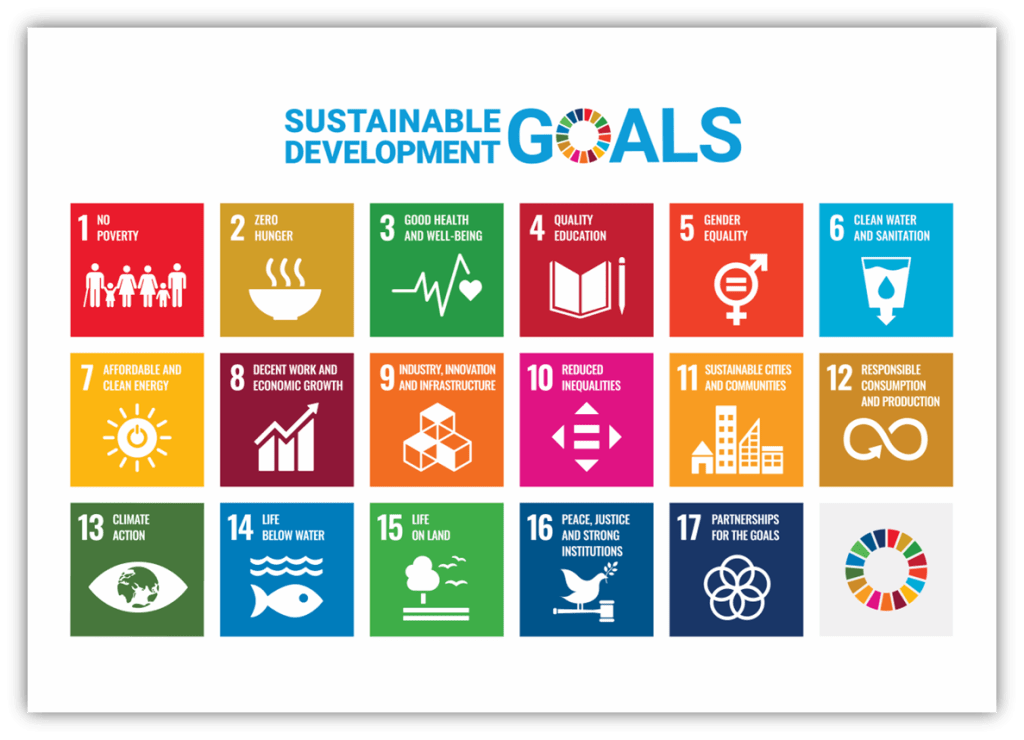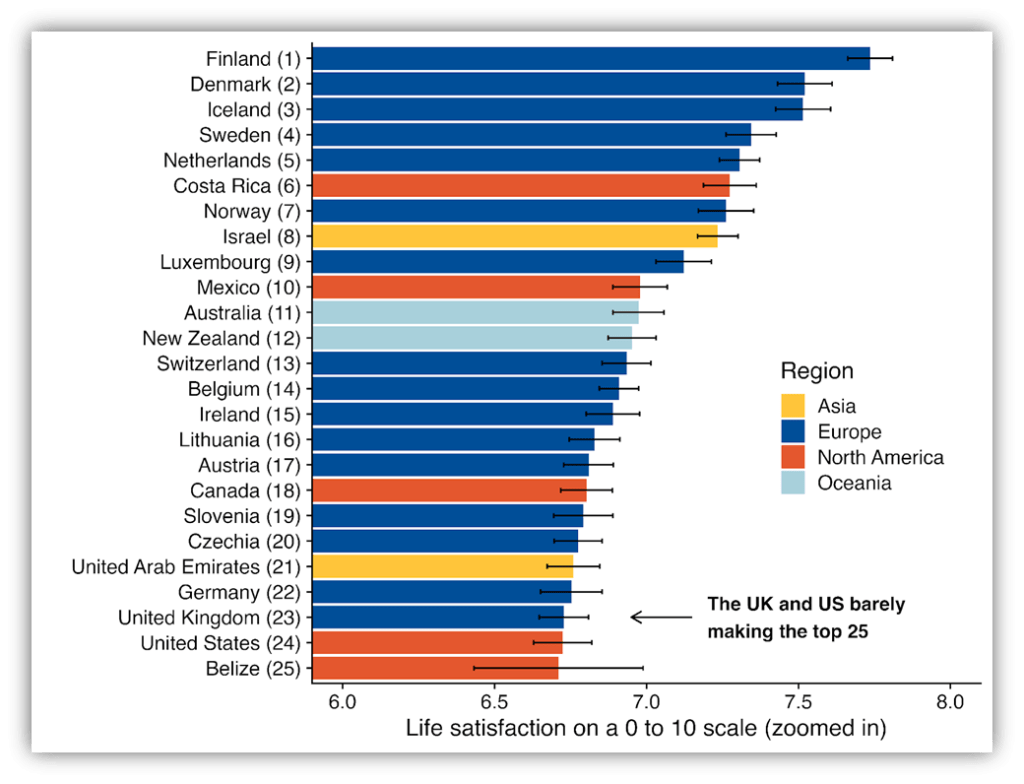My grandfather was a carpenter.

The kind of guy who would build his own tools.
I’m not sure if he made it through high school but he had the kind of common sense that comes from a long, productive, life.
One of his common sense sayings was: “Don’t do what don’t work.”
He was talking about carpentry. But it applies not only to building, say, bookshelves, but also to building relationships, businesses…

…and countries. Don’t do what don’t work.
The corollary is that you should do what works.
It stuck with me. Sure, it’s obvious, but a lot of people try the same thing over and over again thinking they’ll get different results.
When it comes to a country, you can tell whether it’s doing what works based on the happiness of its citizens.

If the people would rather be somewhere else, the country is doing what don’t work.

If they say they’re happy, the country is doing what works.
That’s the basis of the annual World Happiness Report, which ranks each country based on how happy its citizens say they are.
It uses data from surveys — primarily the Gallup World Poll — to weigh factors that contribute to happiness:
- income,
- health care,
- life expectancy,
- social support,
- freedom to make life choices,
- generosity,
- and the perception of corruption.
Basically though, it’s people saying how happy they are on a scale of 1 to 10, averaged over three consecutive years.
Gallup covers only 147 of the world’s 195 countries.

Some nations, like Vatican City and Monaco, are too small to do an accurate survey.
Others may not be included due to political stability, economic infrastructure, population density, or simple logistical issues.
The World Happiness Report started in 2012 as an initiative of the Sustainable Development Solutions Network of the United Nations.
The idea for it came from a group of researchers and economists who recognized that traditional economic indicators — like gross domestic product or consumer price index — don’t really tell you much about a country’s quality of life. A country can have a really high GDP but if that money doesn’t trickle down to the citizenry, they’re likely to be unhappy about it.
The report’s goal was to shift the focus toward measuring and improving global well-being by highlighting how economic, social, and environmental policies can create happier and healthier societies.

It’s now a globally recognized tool for policymakers — if they choose to read it — and its findings have influenced development, social policy, and public investment.
New Zealand, for example, instituted a “Wellbeing Budget” that shifted government priorities from purely economic growth to the overall well-being of its citizens.

Finland implemented programs to improve healthcare, education, and social happiness based on this report.
Some large corporations are starting to focus on their employees’ mental health, too. These initiatives reflect the global conversation — of which the World Happiness Report is a major part — about how prosperity should be measured. Finland and New Zealand, by the way, often rank near the top of the report.
The World Happiness Report for 2025 was just released.

Over its 13 years, it consistently shows that the happiest countries share some characteristics:
- Strong Social Support:
People in the happiest nations typically have strong networks of family, friends, and community. They feel that someone is there to support them in times of need, which fosters resilience and well-being.

Loneliness is a key component of unhappiness.
- High Trust in Institutions:
Happy countries generally have low levels of corruption and high trust in government, law enforcement, and public services.

This trust translates into a sense of security and stability.
- Ample Social Welfare:
Robust public services — like free or affordable healthcare and education, and comprehensive social safety nets — help reduce everyday stresses and contribute to overall life satisfaction.

Note that without that stress, people can be more available to be supportive of their family and neighbors. That leads up back to the Strong Social Support metric above.
- Economic Prosperity for All:
While money isn’t everything, a high GDP per capita and low income inequality mean that citizens can enjoy a good standard of living without the constant worry of economic hardship. The report specifies generosity as a factor and, interestingly, they mean the ability to be generous to others rather than the other way around.

Being financially secure is one thing, but helping others makes you happier
- Freedom of Choice:
A strong sense of personal freedom, including the freedom to make life choices and pursue one’s own interests.

This is a consistent predictor of higher happiness levels.
- Good Work-Life Balance:
Societies that emphasize a healthy balance between work and leisure allow individuals time to relax, pursue hobbies, and spend time with loved ones.

That time away from work boosts overall well-being.
- High Quality of Life:
Countries that invest in public infrastructure, clean environments, and recreational facilities:

These all contribute to both physical health and mental well-being.
And these factors all work together to nurture high levels of subjective well-being.
For example, the Nordic countries frequently top the rankings. Their comprehensive social policies, transparent governments, and emphasis on community support create environments where citizens feel secure, empowered, and free.
The top ten happiest countries in the latest World Happiness Report are all governed by robust, democratic systems.

In fact, most of them operate either as parliamentary republics or constitutional monarchies with parliamentary systems.
These systems are characterized by transparent governance, high levels of political participation, comprehensive social welfare, and a strong rule of law — all of which contribute to high trust in government and social institutions. This stable political environment, equality, and a commitment to public service are the keys to the high levels of happiness reported in these countries.
The least happy countries, on the other hand, don’t share similar systems of government. They tend to be characterized by authoritarian, unstable, or weak leadership.
While these nations officially adopt a variety of governmental forms — ranging from presidential republics to military regimes — the common thread is a lack of effective, transparent, and accountable governance. They tend to share these characteristics:
- Authoritarian Regimes and Autocracies:
Many of the countries at the bottom of the happiness rankings are ruled by leaders who exercise significant power with little accountability. This creates an environment where citizens have limited trust in their government, contributing to lower overall happiness.

In these cases, political freedoms are restricted, opposition is suppressed, and corruption is rampant.
- Fragile or Conflict-Affected States:
Some of the least happy countries are in states of chronic conflict or political instability. Weak institutions, ongoing violence, and a breakdown in public services are common in such environments.

Even if a country is technically a republic or parliamentary democracy, persistent internal conflict and ineffective governance lead to conditions that severely impact quality of life.
- Poor Economic and Social Outcomes:
The lack of strong, democratic governance is often related to poor economic performance, high levels of poverty, and feeble social safety nets.

When citizens struggle to access truly basic services like healthcare, education, and security, their overall well-being suffers.
While there is no single system of government that defines the least happy countries: the key factors are that they are typically marked by low political freedom, limited civic participation, and significant government corruption or incompetence. This stands in stark contrast to the most happy countries, which usually have robust, transparent democratic institutions and a strong rule of law.
The takeaway is that there’s a big correlation between political governance and overall happiness.

Nations with stable, accountable, and transparent governments score higher on happiness metrics –
While those with authoritarian or fragile regimes tend to score lower.
You’re probably wondering where your country ranks on the list. Since most of our readers here are from English speaking countries, I’ll list a few, plus others that strike me as interesting:
| Rank | Country | Score |
| 1 | Finland | 7.736 |
| 2 | Denmark | 7.521 |
| 3 | Iceland | 7.515 |
| 10 | Mexico | 6.979 |
| 12 | New Zealand | 6.952 |
| 18 | Canada | 6.803 |
| 23 | United Kingdom | 6.728 |
| 24 | United States | 6.724 |
| 30 | Kuwait | 6.629 |
| 55 | Japan | 6.147 |
| 68 | China | 5.921 |
| 72 | Russian Federation | 5.945 |
| 99 | Iran | 5.093 |
| 111 | Ukraine | 4.680 |
| 118 | India | 4.389 |
| 141 | Lesotho | 3.186 |
| 145 | Lebanon | 3.188 |
| 146 | Sierra Leone | 2.998 |
| 147 | Afghanistan | 1.364 |
Those three least happy countries have very restrictive governments, and therefore political instability, poor economic outlooks, and minimal healthcare and services.
Meanwhile, the happiest country, Finland, scores only 7.736 on a scale of 10.

They’re on the right track and there will always be complainers, but there’s still some room for improvement.
The United States slipped from #23 last year to #24 this year. We’ll see how it fares in future reports:
As the new government seems intent on doing what don’t work.

Let the author know that you liked their article with a “Green Thumb” Upvote!





If you want to be happy for the rest of your life
Never make a pretty woman your wife
So for my personal point of view
Get an ugly girl to marry you
Please tell me there isn’t cowbell on that song
Apparently I’m 0.004 happier than most of the TNOCS collective. I’ve no idea how to equate that in real life terms. Interesting to see how our respective governments alter the standings given they’re both still fairly new.
Been looking online at previous years rankings and the UK and US have mostly bounced around the 10s to mid 20s range. We’re pretty much back where we were 10 years ago, falling back having got happier in the interim period.
One country that stands out for me is the presence of Israel in the top 10. Without getting into deep and thorny territory it feels anomalous given the situation there.
I saw Israel near the top and didn’t know what to make of it at first, but they meet all the criteria I mentioned above. They have strong social connections, good healthcare, long life expectancy, a robust economy, personal freedom, etc. So even though they’re in a violent conflict with Hamas and doing terrible things in Gaza, the people are happy.
You seem fairly happy, JJ
I can only see the U.S. dropping in the next few years. I wonder where Portugal ranks? We are seriously considering a future there.
Portugal comes in at #60, between Bahrain and Colombia. It’s down from #55 in 2024. It looks like the economy is doing well but there’s corruption, or at least the perception of corruption, so people may think their not doing as well as they really are.
https://data.worldhappiness.report/country/PRT
Portugal comes in at #60, between Bahrain and Colombia. It’s down from #55 in 2024.
I read that in the voice of Casey Kasem, and it made me feel better.
Everything feels better if read in the voice of Casey Kasem.
I still think that tops where this country will be in 3 years. Still looking at it.
It’s a very popular country for relocations in the United States, so much so that there has been some movement to curtail the flow of newcomers who want to live there permanently.
I just hope we can get squeezed in before they cut it off entirely.